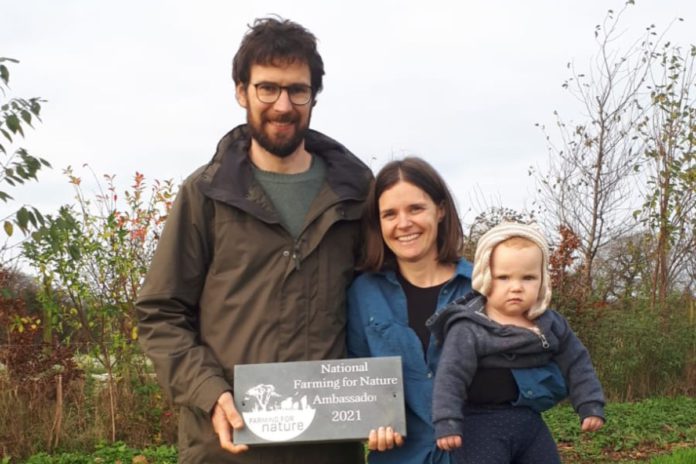That’s Farming, editor, Catherina Cunnane, speaks to the owners of Glasraí Organic Farm, a 7-acre enterprise in Hollymount, Co Mayo. Aoife Reilly discusses venturing into certified organic vegetable production and poultry, growing the business from a blank field to producing 40-50t of veg annually, family life and supermarket’s marketing tactics.
“I am from Kildare, and Joe is from Mayo. Joe grew up on a dairy and beef farm nearby where we now farm.
When he was younger, he was very involved in the farm but had no interest in farming livestock as an adult.
He’s almost vegetarian. I grew up in the countryside and had two cows and three horses. My mother was from a farming family in Galway and hated farming.
Joe inherited our farm from his parents. It is a small fraction of their farm, just 7-acres.
Joe farms full-time. I am part-time on the farm, along with being a parent and home-schooler. We have two full-time employees and 4-5 part-time employees.
Previously, Joe was a carpenter, and he then taught horticulture for a few years. I was in childcare.
Joe completed the Green Cert but only to get our farm. He had no interest in what he was learning about as it was not the kind of farming he was interested in.
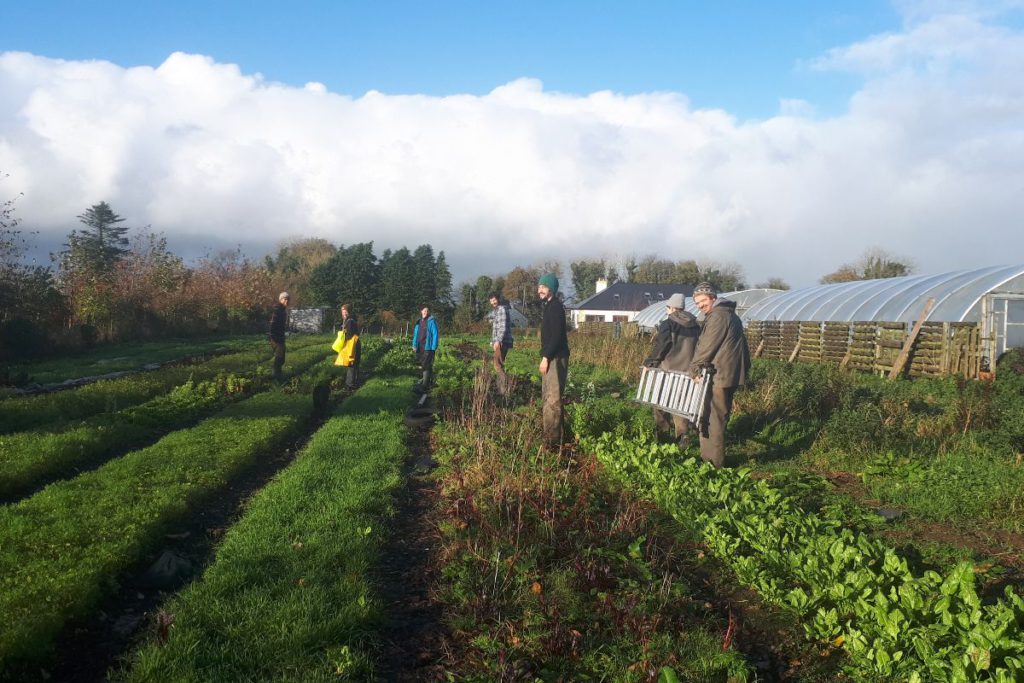
Glasraí Organic Farm
We have organic vegetables and eggs. So, we have 5-acres in vegetable production outdoors, 1-acre in multi-species green manures, and 4 commercial size polytunnels.
Our chicken enterprise works alongside the vegetables as they fertilise and graze our lay area while it is in green manure.
We grow any type of veg that we can, really. As we do markets, we like to have a wide range.
These include potatoes, carrots, parsnips, turnips, cabbages, kale, spinach, broccoli, cauliflower, leeks, beetroot, onions, garlic, salads, tomatoes, cucumbers, courgettes, peppers, French beans etc.
Also, we grow organic strawberries, raspberries, gooseberries, and rhubarb. We produce approximately 40-50t of vegetables annually.
At Glasraí Organic Farm, we grow everything from seed. Processes include seeding, planting out into the field, weeding, crop protection, harvesting and incorporating into the soil.
We have put in 1000s of trees as hedges and shelterbelts to protect our polytunnels.
Chickens also graze around the hedges helping them to get established. We have dug three ponds to encourage frogs to create a biodiverse habitat. But ironically, we have had to fence the field from rabbits to protect the crops as we have a huge overpopulation problem.
So, some wildlife in, some stay out! We also run wildflower strips through our outdoor drills to encourage insects.
It helps to have environments to allow ladybirds, bees, and parasitic wasps to flourish to keep a balance on insects attracted to certain crops.
Also, it is beautiful, and it is nice to work somewhere beautiful.
We have a shed for packing and storage of winter crops. Our polytunnels allow us to grow green leafy veg all winter and Mediterranean crops like tomatoes and peppers in the summer.
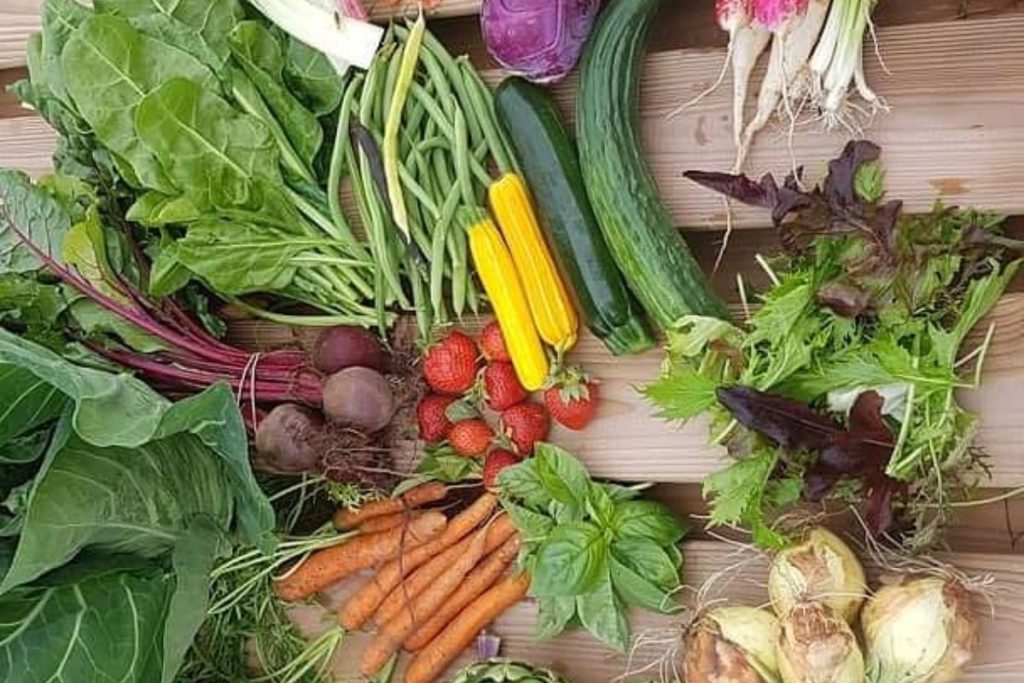
Soil biology
Soil biology is our area of interest. We are passionate and engaged with international movements in regenerative agriculture where agriculture (and more specifically, soil biology) can be approached as a climate change mitigator, a nature centred environment and a way to improve human health.
The relationship between soil microbiology and the human gut microbiome is very interesting.
Responsibilities
Joe manages the farm, both field scale and the polytunnel areas.
He does all the machinery work and delegates responsibilities. Meanwhile, I do all the payroll, accounts, inspections, organic paperwork and manage the manager.
Every day is different. But in the height of the growing season, we have a routine:
- Monday: seeding;
- Tuesday: planting out;
- Wednesday: Field harvesting;
- Thursday: Leaf harvesting and packing;
- Friday: Market and farm maintenance;
- Saturday: Market.
Challenges
There is never, and I mean never a dull moment. We are always learning and adapting, to climate, to market trends, to environmental improvements.
We could be soil biologists, plant botanists, chemists, expert vegetable growers and still be challenged.
Definitely, the fast pace of the summer where there is never enough time in the day or days in the week can be challenging.
We always have moments where we swear, we will get fixed-hour jobs again. Better pay, better hours, less responsibility. But that always passes.
It is a physical job; we have two tractors, but a lot of the work is still somewhat physical. Also, we need to take care that we avoid injury by taking care of our bodies, e.g., regular stretching.
We lost a polytunnel in a storm once. And it was not so much the polytunnel that upset us; it was the amount of work that had gone into building, covering, and planting that polytunnel, especially in the very early stages of our business.
Work-life balance
Having three young children while working on a really busy farm was/is challenging. However, we seem to have gradually found a working farm/family life balance.
As we work from home, we feel like we are always at work. Employing people is another massive challenge. It was a gamble in the first few years to see if we could actually pay people.
And then to understand each individual to keep them happy and rewarded in their work so that they are a positive force on the farm.
Obviously, farming is not a very lucrative industry, but we want our team to feel like working here does meet their needs.
Organic farming and following our principles
We are both really into good healthy food and we don’t believe that chemicals have a place in our food system.
So really, it is not about being organic; it is about following our principles. So, while we, of course, must adhere to organic standards, we also go way beyond standards to grow a crop that is as healthy as possible.
We do not use pesticides, herbicides, or chemical fertilisers.
Instead, we use crop rotations, netting, biodiversity to create a balance of pest/predator, minimal tillage to keep soils healthy, green manures to keep roots in soil as much as possible.
Some of these are organic practises, and others go beyond organics. There is nothing we want to do that we feel we cannot do. Our approach is organic.
We are certified by the Organic Trust. Before we farmed organically, we ate organically. We actually met on a course in organic horticulture, so our interest was mutual. Chemicals don’t belong in our food system.
The farm is still growing very humbly and ‘organically’. We started with a blank field. Gradually each year, we put in some more infrastructure and changed the layouts of things.
Finally, we feel like we are nearing our point of the farm functioning how we would like.
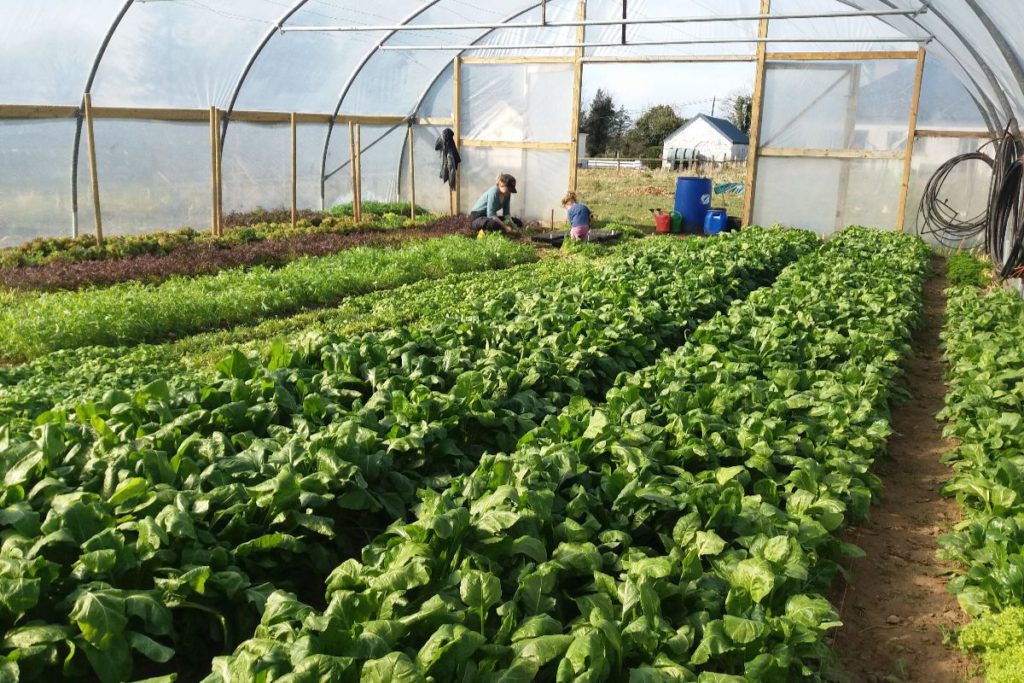
Covid-19 and growing your own
During the first lockdown, business went bananas. The number of online orders we were doing tripled almost overnight.
We had to build a website to cope with the demand. At the same time, restaurants shut. It was our busiest time ever.
And it was interesting that in lockdown, people did become more interested in local organic food, whether that was from a health point of view or simply that more people were cooking at home.
Ask anyone who has grown their own food, and they will swear it tastes so much better. Ask anyone who has tried our tomatoes or our strawberries if they have ever found one in a supermarket that tastes just like them.
We do a farmers’ market in Castlebar, a market stall in Westport, and we sell online also through our website.
Also, we supply Super Valu Westport, Café Rua Castlebar, Ashford Castle and a few other restaurants. Farmers markets’ generate about 80% of our sales
Supermarket vegetable/fruit varieties are generally chosen for their long shelf life or so that they can handle a battering with mechanical harvesters.
We do not have to choose those varieties.
Also, there is the whole issue of nutrients. The nutrient value of vegetables differs greatly.
Our aim is to grow fruit and vegetables of the highest nutrient value so that they really are healthier.
We focus on our soils to achieve this by ensuring the soil biology is thriving.
This allows nutrients that might not usually be available to the plant to become available—healthy food=healthy humans.
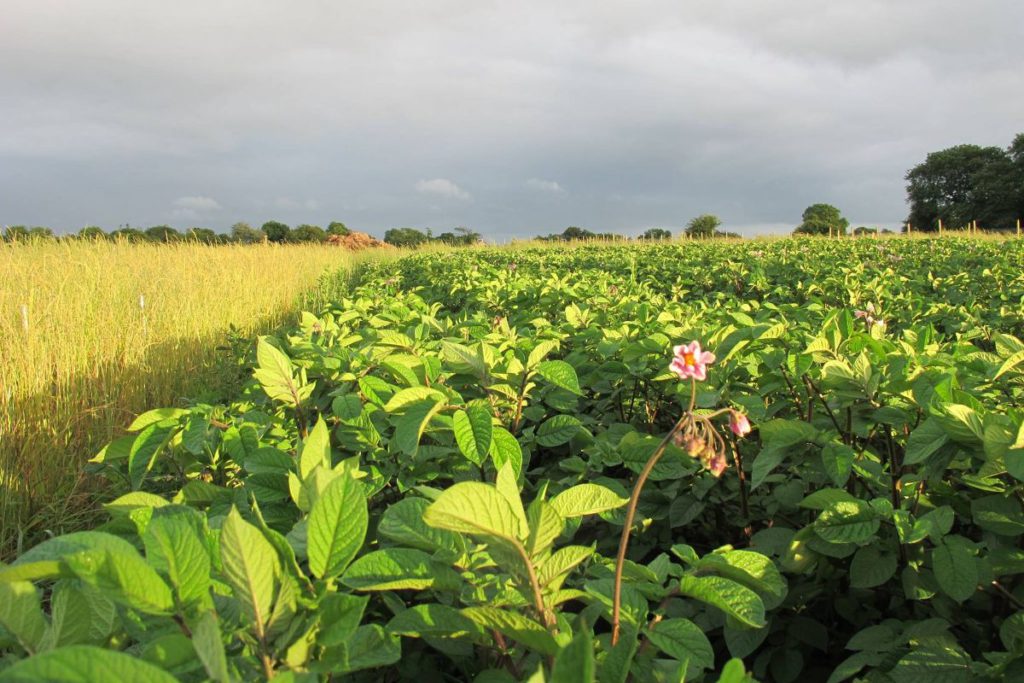
Price
Our price reflects the costs of growing good food without leaving damaged soils behind.
Supermarkets are notorious for squeezing vegetable growers for every cent to keep their prices artificially low.
And they employ marketing tactics like below-cost pricing to attract customers.
We are never going to compare ourselves to unfair pricing. Vegetable growers have all but disappeared in Ireland because of this pressure.
Eating seasonally and local is probably the best way to eat, and what it may cost to do so may save you a lot in healthcare costs.
Farm viability
We believe it is viable to make a living from a 7-acre farm. However, we are only five years in business and still every year is different.
We are currently making a living, but right now, we have a lot of employees. This reflects where the farm is at as we are still establishing some parts of it.
Because of the small size of the farm, we also don’t receive much from the grants, just enough to cover the costs of our organic certification.
I do not believe this kind of farming will ever make anyone a luxurious living.
However, there are sometimes other values to be considered such as healthy lifestyle, as much good food as you can eat etc.
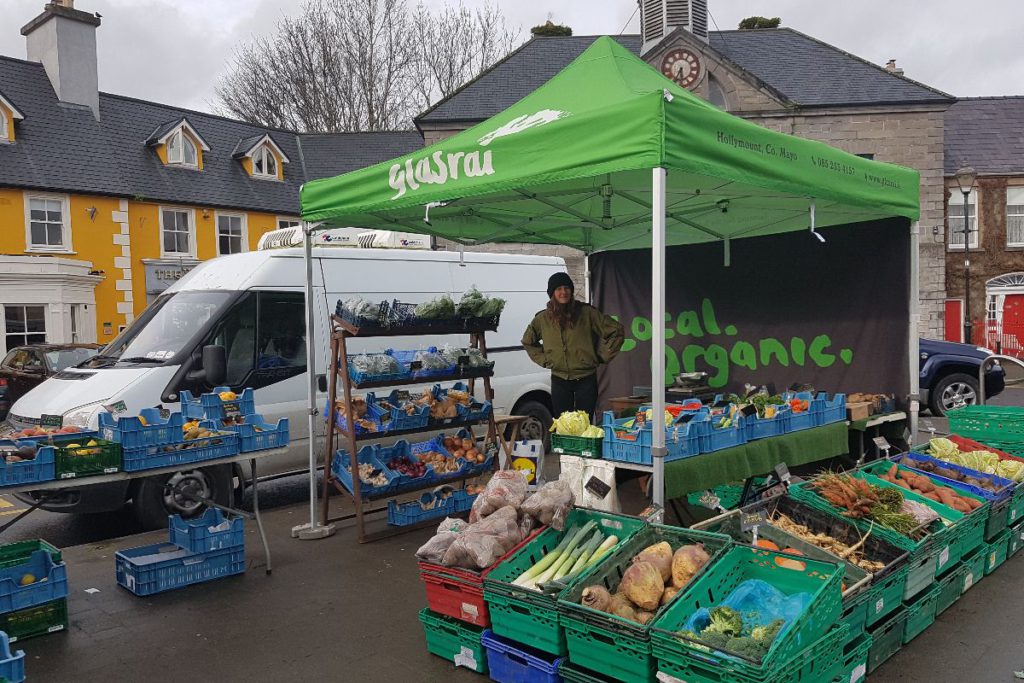
Getting smaller
Our plans for the future are to get smaller. Well, to find a size that works to support our family while sustaining (not exhausting) ourselves.
It is a delicate balancing act of market size, employment needs, financial needs, and healthy life balance.
We seem to evolve season by season and adapt to what feels right to how we run the business.
Our ultimate goal is to feel like we are doing something worthwhile.
Reflection
It has been a dive into a bottomless lake of learning, challenging, and innovating.
Every year, every employee and every customer we encounter can change so much for us.
We love the way our farm is totally free (from grants, from advisors) to follow these changes and constantly evolve. Our farm is changing the way we feel it should; not the way industry is changing.
The future of agriculture does not look great right now. I think we are lagging behind trends in Europe to move more towards organics and a cleaner form of farming.
Russia is going completely organic. Fertiliser costs are bound to skyrocket as the price of fossil fuels increases. Diesel prices too, which they should if we are to address climate change issues at all.
I think farmers are not prepared for the change; it’d be nice to see their advisors help farmers address these changes.
I think you can kind of make out the department grants system nudging farming slightly towards more planet-friendly approaches. But there is no real momentum driving that, and I think that is sad.
We think it is inevitable that many will make the switch to organics in the future.
We think it’s a pity that farmers do not really seem motivated to do less harm. But we see those who have made the switch do incredible things.
And we think farming has so much potential to improve human health and environmental health while mitigating climate change through carbon capture.
It would be so nice to see people get excited about farming and its potential and to want to learn about carbon capture and regenerative practices. Maybe one day,” Aoife of Glasraí Organic Farm concluded.
To share your story like Glasraí Organic Farm, email – [email protected]
Other articles:


